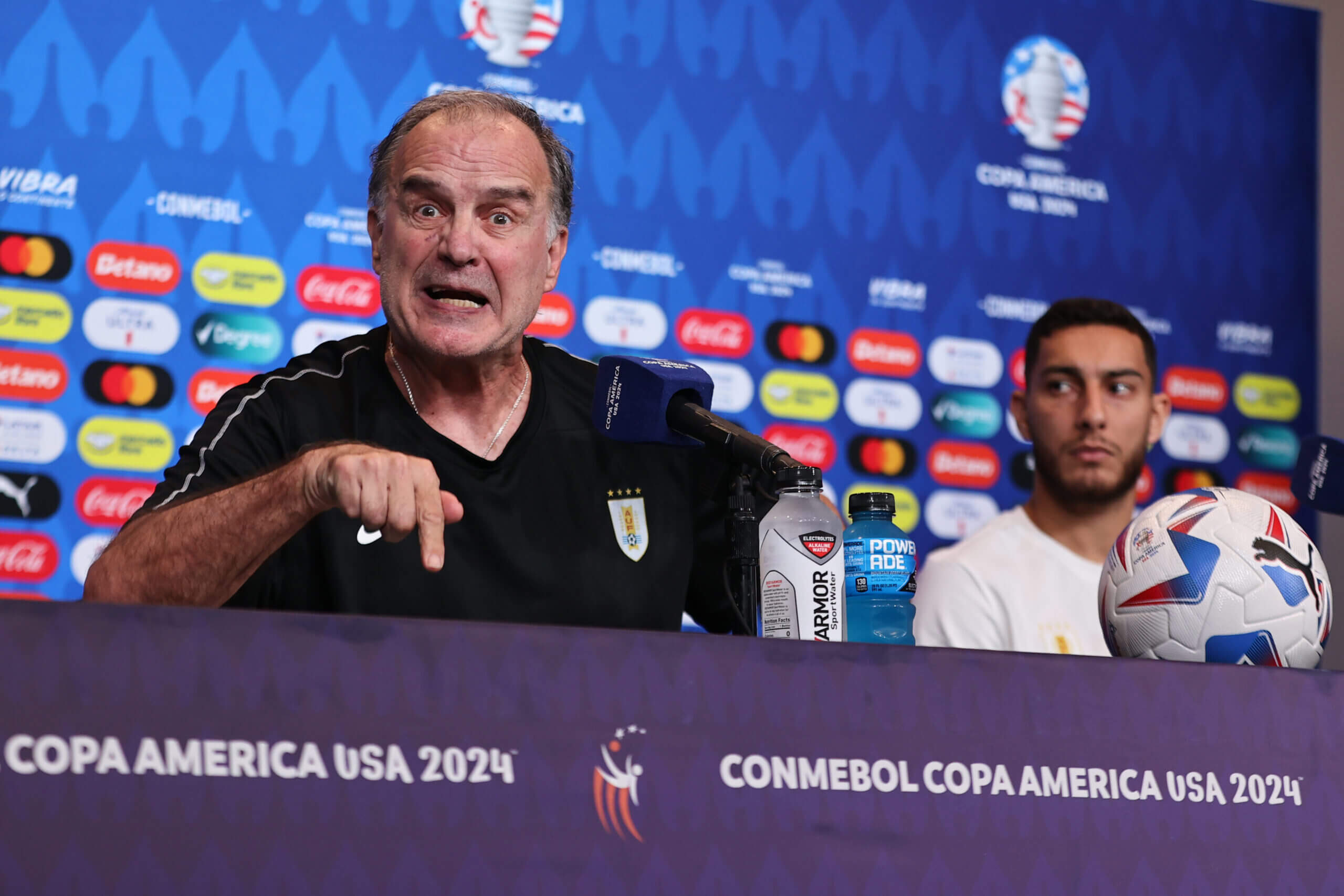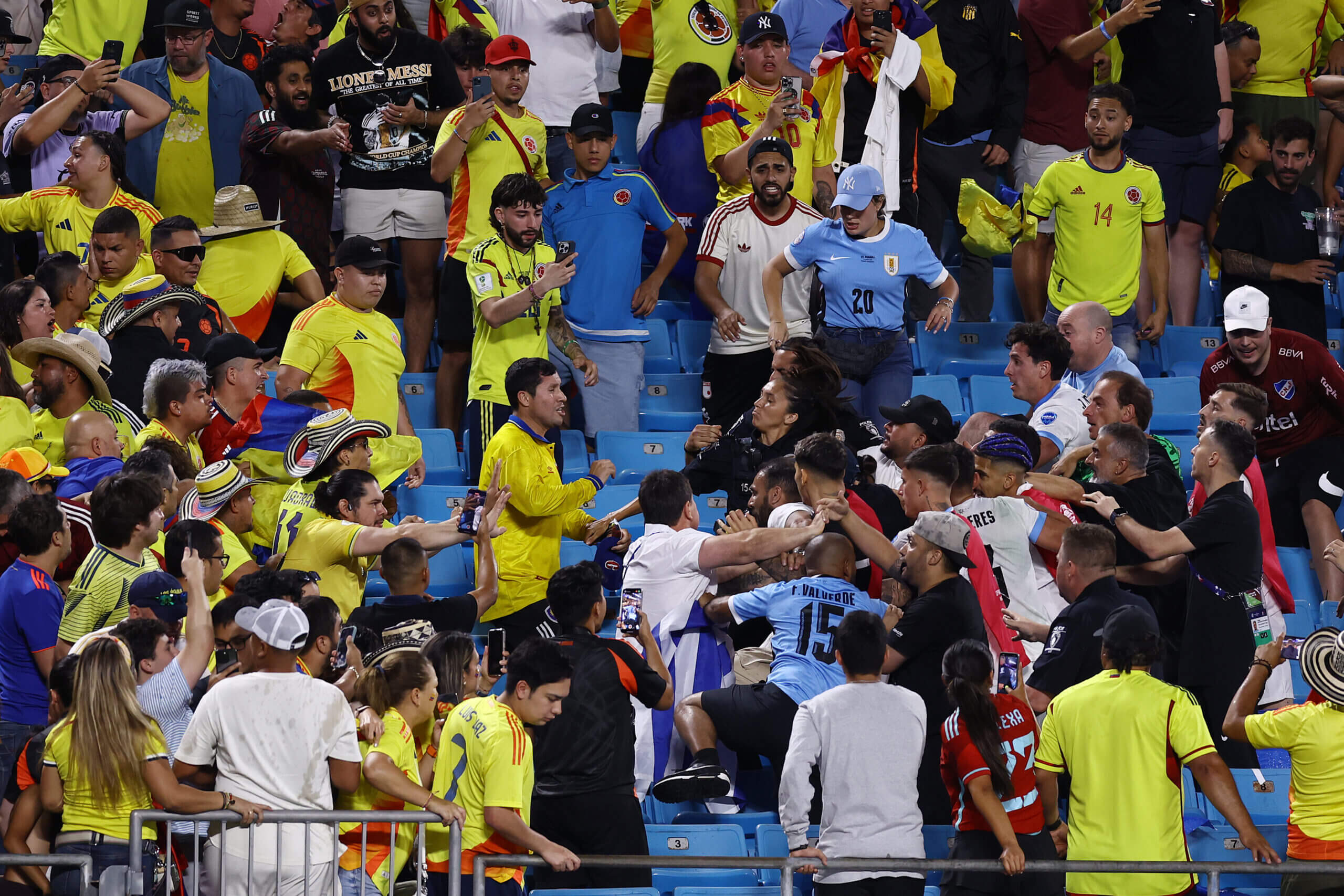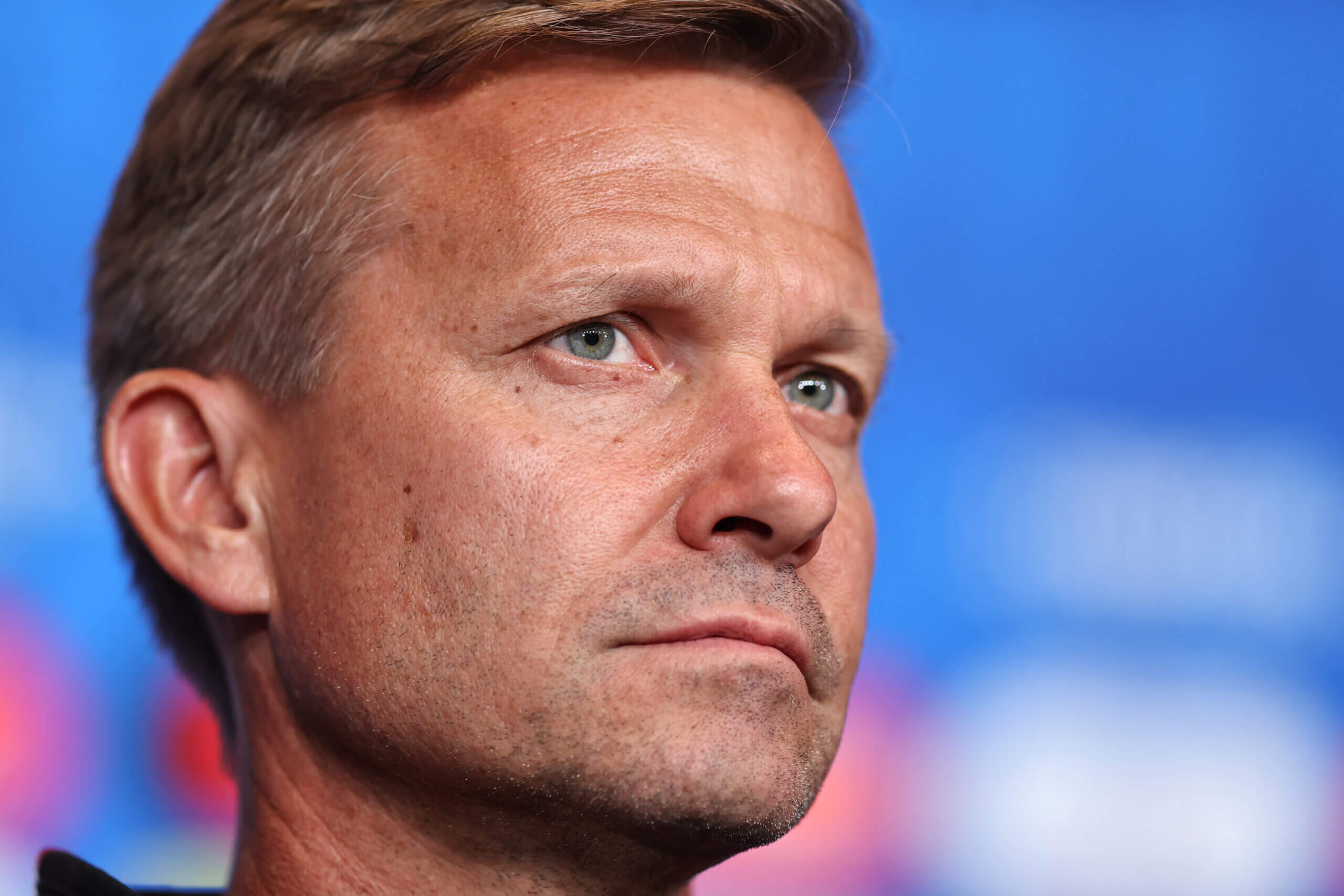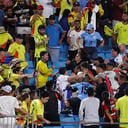GO DEEPER
How Uruguay vs Colombia descended into chaos – and the questions raised by the ugly scenes
In the aftermath, reports out of Argentina have suggested that up to 10 Uruguay players may face some level of discipline for their role in the altercation. So a reporter for Uruguayan radio outlet Sport 890, then, asked a simple enough question:
ﻗThese last 24 hours have been consumed by everything that happened after the game against Colombia,ﻗ he asked. ﻗAre you worried about what happened given the possible sanctions your team is facing?ﻗ
The notoriously blunt Bielsa immediately made it clear he felt the reporter had misstepped. The Uruguay coachﻗs voice trembled. He struggled to contain his disgust as he began to offer his answer.
ﻗI said something the other day,ﻗ Bielsa said, staring intently at the media member. ﻗI said that media members shouldnﻗt ask anybody any questions when they already have enough evidence in front of them to draw their own conclusionsﻗ۵ so, how can someone ask me if I have fear about the sanctions that are coming when the only logic that applies in this situation is that mothers, with babies in their hands, women, sisters, were attacked by the spectators?ﻗ

Marcelo Bielsa did not mince his words during Saturdayﻗs press conference (Omar Vega/Getty Images)
Press conferences like these are sometimes about pre-existing relationships and trust, and the trust between a head coach and a journalist can sometimes be fractured by something as simple as asking the correct question in the incorrect way.
If Bielsa had simply been asked to expand on his feelings about the incident, this reporter may not have faced the inevitable shitstorm that the Argentinian threw at him. In Bielsaﻗs eyes, though, the journalist had reduced a very human issue to a sporting one. Bielsa, widely known as a hardline, principled head coach, was not about to let that slide.
ﻗThe only thing I can tell you is that the players reacted however any other human being would,ﻗ Bielsa said, his voice getting louder and louder. ﻗ(If you see) your woman or your mother or a baby are being attacked, what would you do? Youﻗd ask whether theyﻗre going to punish the people who defended themselves?ﻗ

It was clear, at this point, that Bielsa cared little about getting fined and even less about what anyone in the room thought.
ﻗI donﻗt know who you are and I donﻗt know any of you,ﻗ he said, motioning to the journalists in the room. ﻗBut you know that there are certain percentages of journalists who donﻗt attack certain things because itﻗs not convenient for them financially. Yes? Am I lying? You donﻗt want to say it because of corporate interests. I have to say it.ﻗ
Many in the crowd were not about to be called corporate cronies, more or less, and a half-dozen or so Uruguayan journalists began loudly objecting to Bielsaﻗs comment. It was a remarkable, rarely-seen exchange, especially in the sometimes staid world of British and American football.
The Argentinian wasnﻗt suggesting that every journalist operates that way but the reporter he directed the answer to was so mortified that he got up and left the room.
Others joined in: ﻗNo sabes de lo que estﺣ۰s hablando,ﻗ one journalist said. ﻗNo es justo.ﻗ ﻗ ﻗYou donﻗt know what youﻗre talking about. This isnﻗt fair.ﻗ
Bielsa did not care, telling anybody in attendance that certain journalists ﻗrespond to interests, the ones that administer power and give out moneyﻗ.

Uruguay players clashed with supporters following their semi-final loss to Colombia on Wednesday (Tim Nwachukwu/Getty Images)
You could almost feel Bielsaﻗs rage building in the room. You could basically see him cross over the line where he stopped caring about how his comments would be perceived and if there was any doubt over his conviction, he eliminated it by saying heﻗd ﻗalready said all of the stuff I told (the tournament organizers) I wouldnﻗt sayﻗ. He laid into the playing field, the officiating, all of it.
ﻗIﻗm tired,ﻗ said Bielsa, who began banging the table to add more weight to his words. ﻗAll of this has to do with all of these unfair things, over and over again, that you accumulate. They say the referees are fine, the pitches are fine, and all of these lies. They do press conferences to say, ﻗNo, the field is fineﻗ, and you see the pitches are awful, and then they say, ﻗNo, the training fields are fine tooﻗ, and then you see Bolivia not even training. I have all the photos that show that itﻗs all a lie.
ﻗThis is a plague of liars,ﻗ said Bielsa, drifting into Shakespearian or maybe even biblical territory.
A press officer from the Uruguayan federation, at this point, tried to throw Bielsa a lifeline by ending the press conference early. Remarkably, Bielsa waved him off and fielded another question. We should be thankful.
Bielsa doubled down on his security complaints, stating that the United States should be more than capable of handling the tournament. ﻗPut this in air quotes, this is the ﻗcountry of safetyﻗ, yes?ﻗ He brought up the so-called ﻗFIFAgateﻗ, the U.S.-led investigation that led to the fall of former FIFA boss Sepp Blatter and a host of other administrators at footballﻗs global governing body. In the same breath, he seemed to absolve the Americans a bit. ﻗThe North Americans donﻗt say that youﻗre going to get a perfect pitch,ﻗ said Bielsa. ﻗThey tell you, ﻗWeﻗll install you a field three days ago, or X amount of days agoﻗ.ﻗ
Bielsaﻗs press conference dragged on for some 45 minutes, much longer than a typical ﻗmatchday minus-oneﻗ affair would typically go.

Within minutes of his departure, the internet was alight with his comments. In an era full of carefully measured statements, Bielsaﻗs unfiltered commentary felt like a salve to football fans across the globe.
Before long, Canada head coach Marsch had gotten a taste of Bielsaﻗs remarks as well, watching on his cell phone. Marsch, who took the Canada job in May, earned a reputation as a hard-nosed defender during his distinguished career in Major League Soccer. His coaching career in the United States and Europe alike has also demonstrated his capacity for blunt, honest talk.
His Canada side have faced their own adversity: what they perceive as sub-par refereeing and a series of disgusting instances of racial abuse aimed at their players. On Friday evening, in front of only a handful of reporters, Marsch ﻗ like Bielsa ﻗ seemed like heﻗd had enough.
ﻗI saw some of Marceloﻗs comments,ﻗ said the former Red Bull Salzburg coach. ﻗﻗ۵for me, this tournament has not been professional.
ﻗThere are too many gaps in the treatment, the overall experience from a day-to-day perspective. I watched what happened after the Uruguay vs Colombia match and certainly, I didnﻗt know all the details ﻗ Iﻗm certain we wouldnﻗt want anyoneﻗs families or any playerﻗs families to be put in harmﻗs way.
ﻗI know if our team would have responded like this, there would be heavy sanctions because of the treatment we received in this tournament the whole time. Weﻗve had our players headbutted, weﻗve had racial slurs thrown at our players, live and through social media. And not just the situation with Moise Bombito but throughout the entire tournament, from opponentﻗs fanbases, live or on social media. Weﻗve been treated like second-class citizens.ﻗ

Canada head coach Jesse Marsch said that his team had been ﻗtreated like second-class citizensﻗ (Omar Vega/Getty Images)
Marsch, who went on to express pride in his players for how theyﻗve handled said adversity, was not done. His comments quite understandably lacked the all-out anger that Bielsaﻗs displayed but the tone and delivery of his statements said quite a bit.
ﻗWeﻗve often been accused ﻗ by the opposing coach before the matches are played, to the referees ﻗ that we cross the line, weﻗre overly aggressive,ﻗ said Marsch. ﻗAnd yet, if you look at the CONCACAF teams and the treatment that they get in games, the yellow cards per foul rate is way higher for every CONCACAF team. I watched the Uruguay-U.S. game and it was one of the most biased-reffed games against the United States that Iﻗve ever seen, on their home soil.ﻗ
Marsch has been feeling his oats a bit these days and deservingly so. Rebuffed for the USMNT job a couple of years back, Canada now stand as the only North American team remaining in the competition. The man U.S. Soccer chose over him, Gregg Berhalter, is out of a job after being sacked last week. Marsch wouldnﻗt bite when asked what he thought of that dismissal.
ﻗI hope they find the right guy,ﻗ he said. It felt a little pointed.

Third-place matches are generally viewed as throwaways, a little free soccer at best and a shameless cash-grab by organizers at worst. That logic may have applied to this encounter too but after witnessing a pair of the tournamentﻗs most compelling managers ether the tournament organizers ﻗ and anybody else they could find ﻗ tomorrowﻗs matchup between Canada and Uruguay feels much more meaningful.
Not that either manager even talked about the game in the press conference.

GO DEEPER
Copa America final security: Will plans change after semifinal chaos?
(Top photos: Canada head coach Jesse Marsch, left, and Uruguay head coach Marcelo Bielsa; Getty Images)
Source link : https://www.nytimes.com/athletic/5634878/2024/07/13/bielsa-marsch-copa-america-uruguay-canada/
Author :
Publish date : 2024-07-13 08:37:53
Copyright for syndicated content belongs to the linked Source.












